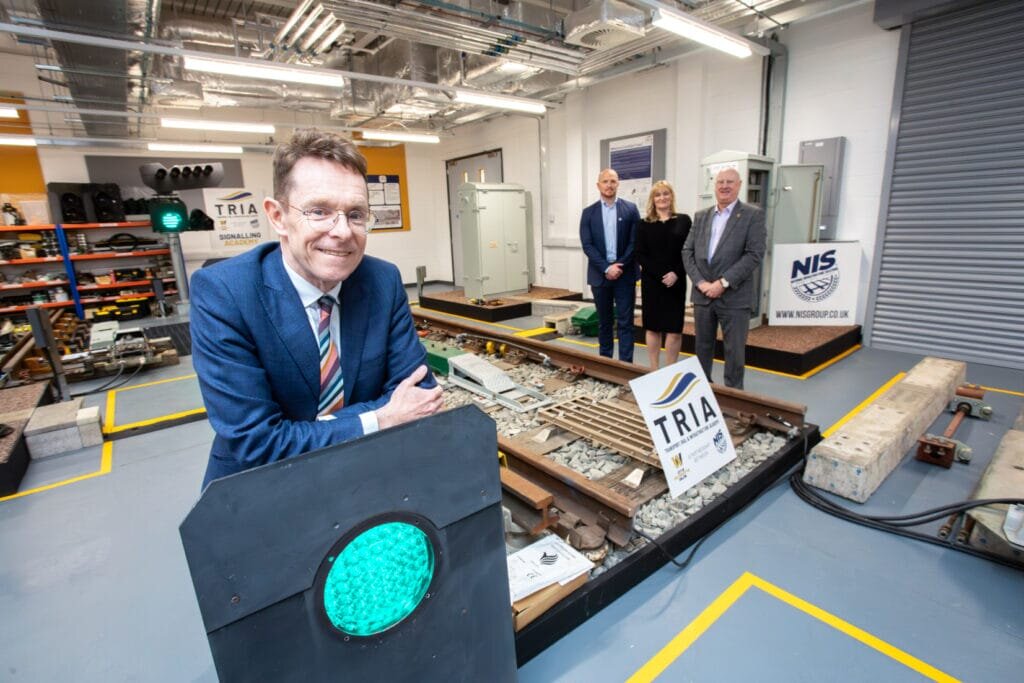Andy Street, Mayor of the West Midlands, officially opened a new region-wide rail training academy yesterday designed to support hundreds of new training and employment opportunities for local people in the sector.
The Transport, Rail and Infrastructure Academy (TRIA), which has been developed by the City of Wolverhampton College and National Infrastructure Solutions (NIS), will give individuals entry and advanced skills required to gain sustainable jobs, whilst also meeting the demand for skilled operatives to work in the construction and maintenance of train lines, tram routes and stations.
The launch took place at TRIA’s new site at the Black Country Innovative Manufacturing Organisation (BCIMO)’s Very Light Rail National Innovation Centre in Dudley, where the Mayor also cut the ribbon on a state-of-the-art new Signalling Academy.
To support residents into good jobs in rail, the WMCA is investing £1.1m to create 432 training places at the Dudley site.
Andy Street, Mayor of the West Midlands and Chair of West Midlands Combined Authority (WMCA), said: “Hundreds of millions of pounds are being invested right now into the region’s train and tram network, with new rail lines and stations being built and new Metro routes under construction.
“That’s great news for the travelling public but we also need to make sure this unprecedented investment benefits local people in terms of new jobs and careers. That’s why the WMCA is helping to fund this state-of-the-art training academy and matching skills courses to the needs of our regional economy.

“I can’t wait to see local people land good quality jobs in the rail industry as a direct result of this latest investment, further cementing the role of the West Midlands as the training hub of the UK.”
TRIA is an extension of a 5-year partnership between the City of Wolverhampton College and National Infrastructure Solutions (NIS), the latter a leading provider of training in the rail, civil engineering, and utilities industries.
The Dudley site boasts more than 2000 metres of conventional rail track, including two split-level platforms, an 870m tunnel and signalling components to give students hands-on training in multiple disciplines across the industry and enhance their learning experience by working with the same equipment as used on rail construction sites.
This latest development has seen the two organisations leverage considerable investment from the private sector as employers rush to back the training model and the new Signalling Academy highlights even further how training courses are being developed to meet a real need in the industry.

: (l-r) Davie Carns (NIS), Malcolm Cowgill (City of Wolverhampton College), Tavoy Wilson (Learner at NIS), Andy Street (Mayor of the West Midlands) and Lynn Parker (City of Wolverhampton College).
Davie Carns, managing director of National Infrastructure Solutions, continued: “Our partnership with City of Wolverhampton College and the WMCA is now in its fifth year and, by working together, we have delivered training that has created sustainable employment for more than 2000 people.
“TRIA is the next step in the relationship and will give us the framework to provide specialist courses across multiple locations in the West Midlands, encouraging greater employer engagement and the potential for more jobs.
“The Black Country Signalling Academy at BCIMO is another example of how we are listening to businesses and developing training for more technical roles that are currently in high demand.
“Our first six months in Dudley have been a resounding success with 500 students trained already. This is just the start.”

Malcolm Cowgill, principal of City of Wolverhampton College, added his support: “The economic climate at the moment means we need to support local people into jobs.
“Working in partnership with our training provider NIS, the academy will offer employer-led training to address skills gaps in specific areas, focussing on getting entry-level candidates into work, upskilling existing operatives and ensuring that the workforce is equipped with the latest industry-recognised qualifications and accreditations to ensure sustainable skilled employment now and in the future.”
TRIA already has an industry-standard rail training site at the college’s Wellington Road campus, in Bilston – which features more than 40 metres of railway track and was the first in the UK to offer training on slab track technology which is used in the construction of high-speed rail lines – with plans to open an additional site in Aston, Birmingham, later in the year.
For further information, please visit www.wmca.org.uk or www.nisgroup.co.uk







